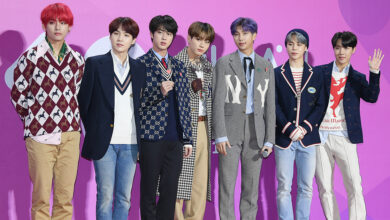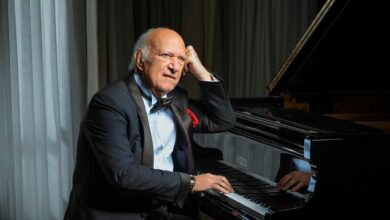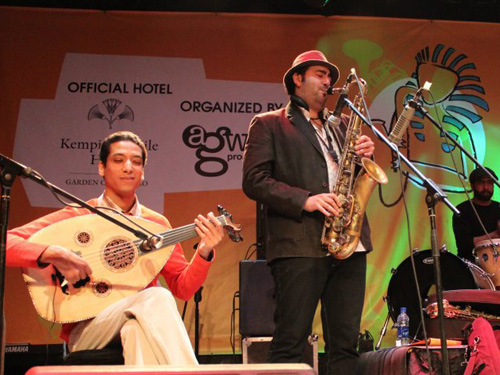As Tahrir rapidly imposed itself as the epicenter of the Egyptian revolution and a space of peaceful demonstrations, a frenzy of creativity budded on the ground. Songs were written in haste, a few instruments gathered and tuned to give birth to songs of the revolution, whose melodies and words rose into the air of downtown Cairo and dispersed all over the world, gaining in intensity and resonance in the process.
While artists in Cairo composed and created songs to support and give a voice to the Egyptian revolution right from Tahrir, many international artists (from the Middle East and the US for the most part) released songs in solidarity with the Egyptian people.
Although singers affiliated with various musical styles have shown support for the Egyptian people, the style that prevailed–or at least that had the biggest impact–in this fight for freedom and liberty is rap music.
East and west, north and south, rappers have emerged as the voice of the revolution, with potent lyrics and efficient beats channeling the people of Egypt’s frustrations and aspiration for freedom and democracy.
Moroccan-born female rapper Master Mimz, based in London, has released a two-minute lyrical fury titled “Back Down Mubarak” with slamming lyrics on US rapper Ludacris’s “Number One Spot” beat. With a twist of M.I.A-like rapping style, Master Mimz raps “Mubarak, not Barack, wanna make me go throw that rock.” While pictures of the protests scroll across the screen, she sings: “It’s our town-like it or not/Wanna lock us down-no click no mouse/We burn your house-kids, spouse/Everybody gonna fuckin’ be knocked out.”
Ludacris’ “Number One Spot” is an appropriate choice. It originally begins with the lyrics “I’m never going nowhere so don’t try me.” In substance, almost word for word what the peaceful demonstrators have been chanting for 18 days in a row: “He’s leaving, we’re not leaving!”
Although the artistic quality of some of these “solidarity songs” has to be seriously questioned, the fact that an artist like Wyclef Jean (formerly of the band the Fugees) wrote a song for the Egyptian peace fighters is significant. “I see the Youth, with the scars on their faces, these are scars of courage” sings Wyclef, sitting in a recording studio with a large Egyptian flag hung behind him and a smaller Haitian flag. The video clip of “Freedom (Song for Egypt)” superimposes scenes of the popular revolt and of the singer himself playing acoustic guitar. “I see my sisters, I see their eyes through their veils, it’s been two weeks and their kids are running out of milk,” he sings, while a shot of an Egyptian woman brandishing a placard reading “You’re leaving, Mubarak” appears.
Wyclef and Master Mimz are not the only ones putting out #Jan25-inspired rhymes.
A-list Arab-American rappers–Omar Offendum, the Narcicyst, Freeway, Amir Suleiman and vocalist Ayah–have collaborated to create the energy-filled track “Hashtag25jan Egypt,” produced by Palestinian-American producer Sami Matar. On the blog “Hot Arabic Music,” blogger Hanitizer expresses unfettered admiration for this band and its song, “which truly fires you up and makes you want to attend a rally and shout to bring an end to the injustice you see.” The smartly-named rap song has potent lyrics that start with the following lines, “"First, they ignore you. Then, they laugh at you. Then, they fight you. Then, you win." The accompanying video montage is probably one of the best so far, despite its being produced in haste.
Berlin-based Scarabeuz, who is half Egyptian half Dutch, released, along with Omima, the song “Long Live Egypt: Ta7ia Masr,” entirely sung in Arabic. The highly sentimental lyrics and videos work fine together, and the mention of a much-desired pan Arabism is revived with: “Long live Tunis, Palestine and Arab Unity: Long live Egypt.”
The Meesh Ba’eed Khalas Mixtape Vol.1 can be regarded as the grand finale. It is a free compilation of songs from hip-hop voices of the uprisings in Tunisia, Egypt, Lybia and Algeria. The album cover is a collage of various Arab dictators, with Ben Ali’s forehead merged with Gaddafi’s unmistakable thin moustache and prominent chin. Rising stars of rap and hip-hop like Tunisia’s El General, Algeria’s Lotfi Double Kanon, Egypt’s Ramy Donjewan, and Libya’s Ibn Thabit contribute to the compilation. The twelve tracks burn in the stone the names of these daring and rebellious artists.




